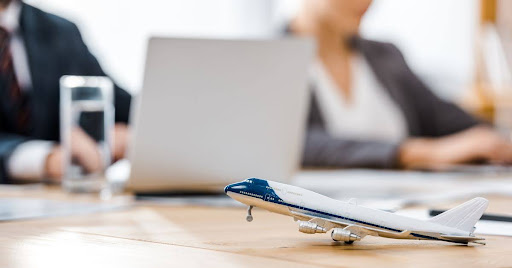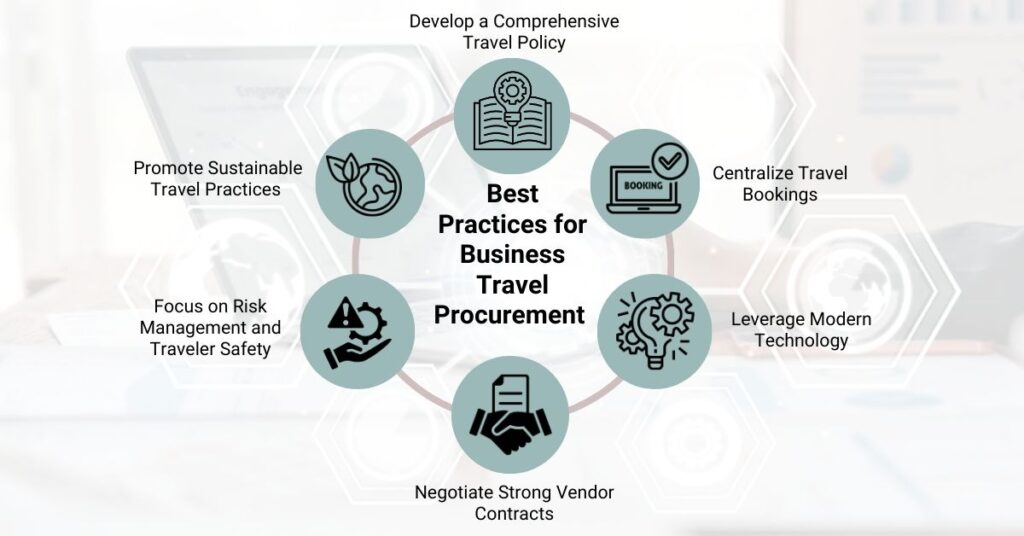
Did you know that business travel is one of the most booming industries at the moment? According to Fortune Business Insights, the global business travel market is expected to reach $2,765.34 billion by 2032. Hence, it is no doubt that the demand for business travel is soaring.
You must know the challenges if your organization has employees traveling frequently for business purposes. Some of the major hurdles include:
- Cost control
- Policy compliance
- Traveler satisfaction
Without a robust business travel procurement process, you may struggle with price rises, inconsistent booking, and unsatisfied employees.
This is precisely where a solid procurement strategy can be a game-changer. With the right techniques and practices, you can enhance your company’s operations, save travel costs, and keep your employees satisfied and happy.
Hence, this blog will help you understand the procurement process in business and the best practices to follow.
What is Business Travel Procurement?
Business travel procurement is a process in which companies manage all their business travel activities. It is a strategic process that involves sourcing, negotiating, and managing all aspects of business travel. This includes air travel, accommodations, transportation, and other services. The process ensures cost-effectiveness and traveler satisfaction in alignment with the organization’s policy and objectives.
The primary goal of corporate travel procurement is to streamline travel activities. By leveraging volume for better pricing and terms, you can improve the overall travel experience for employees.
This process includes various activities such as:
- Negotiating deals and discounts with suppliers,
- Preparing a robust travel policy
- Implementing state-of-the-art technological solutions.
All of these help organizations analyze data and identify cost-saving opportunities and areas of improvement.
Key Components of Business Travel Procurement
Successful corporate travel procurement strategies depend on balancing the many constituents. They ensure efficiency in cost, control, and traveler satisfaction.
Mentioned below are the key components that form the basis of the process:
1. Travel Policy Development
Your organization’s travel policy serves as a foundation for the procurement strategy. The document outlines the rules and guidelines employees must follow when booking travel. A good policy sets out approved booking channels, spending limits, and preferred suppliers whilst allowing flexibility for travelers within the confines of policy compliance.
2. Supplier Management
You must develop strong relationships with travel suppliers as an organization that frequently travels for business. These include airlines, hotels, and ground transportation providers. The procurement team negotiates with them to get the best deals and discounts without compromising policy compliance and travelers’ comfort.
3. Technology Integration
Tools such as corporate booking platforms, expense management software, and data analytics solutions streamline the business travel procurement process. These technologies help enforce compliance, provide real-time data, and automate reporting, reducing administrative overhead.
4. Data and Analytics
Data-driven decision-making is key to the travel procurement process. It is beneficial for monitoring travel patterns, identifying and considering cost savings opportunities, and assessing suppliers’ performance. Through insight from analytics, organizational planning could assist in formulating future direction policies.
5. Risk and Compliance Management
Any travel department must aim to protect travelers’ health and safety. This implies tracking travelers, providing 24/7 support during emergencies, and ensuring compliance with all corporate policies and government mandates.
A well-structured corporate travel procurement process facilitates results-oriented travel management focusing on the company and the traveler.
| “40% of businesses expect to increase the amount they travel in 2025, and business travel is surging, exceeding the pre-pandemic levels.” |
Best Practices for Business Travel Procurement
Adopting best practices in business travel procurement guarantees cost-effective travel, adheres to policy requirements, and ensures traveler satisfaction.
Mentioned below are some of the best practices you can follow for corporate business travel procurement in your organization:

1. Develop a Comprehensive Travel Policy
Travel policy is the most important aspect of procurement strategy. It provides a clear directive for your employees.
- Your travel policy must correctly define guidelines for approved booking platforms, preferred suppliers, allowed expenses, and reimbursement procedures. For example, you can make booking flights through a dedicated platform or booking preferred airlines mandatory.
- While cutting costs, travelers’ comfort cannot be compromised. You must consider traveler preferences, such as the type of hotels or flights. This enhances compliance and also ensures employee satisfaction.
- Once the policy is finalized, ensure that all employees know it. You should ensure that each employee is communicated about it and has access to it. You can conduct training sessions, send emails, or announce in meetings for effective communication.
2. Centralize Travel Bookings
One important factor in the travel procurement process is centralizing bookings. Centralized bookings can streamline business travel and cut down on business travel costs.
- By partnering with airlines, hotels, and ground transportation, your organization can get discounts and deals. For instance, you can save up to 25-30% on flights to hotels when compared to standard prices.
- With a centralized system in place, you can ensure policy compliance, save costs, and identify any trends in cost leakages.
- With the help of a Travel Management Company (TMC), you can provide support to stranded travelers or during any emergency. For example, itilite-a renowned TMC offers round-the-clock travel support for flight bookings or assisting travelers in case of any emergency.
3. Leverage Modern Technology
For a robust corporate travel procurement, technology plays a very important role.
- When you leverage tools such as itilite, it helps enable your employees to book within the travel policy. They also get access to customized travel options. This reduces any out-of-policy bookings and saves costs.
- Automating your expense reporting helps reduce errors, fastens reimbursement, and provides visibility into real-time spending.
- You can track metrics such as average travel costs, employee satisfaction, and vendor performance by utilizing insights. This data helps you to develop your procurement strategies.
4. Negotiate Strong Vendor Contracts
You can optimize costs and other services by establishing strong relationships with vendors.
- By using your company’s travel volume, you can negotiate better rates with airlines, hotels, and car rental companies.
- As the right approach, you should include perks such as free internet, quick boarding, or complimentary breakfast. This enhances traveler satisfaction.
- You should frequently evaluate vendor performance to make sure they are delivering on agreed terms and are aligned with the contract.
5. Focus on Risk Management and Traveler Safety
For business travel procurement, employee safety is of utmost importance. You must proactively manage risks to ensure employees feel safe, hence leading to better satisfaction and higher productivity.
- As a business owner, you must ensure that every trip has an attached comprehensive insurance. This is especially true for emergencies such as medical issues, baggage losses, or even flight cancellations.
- You must leverage live traveler tracking to monitor employees’ locations and give them real-time travel updates.
- For handling emergencies like natural disasters or geopolitical events, you must have a clear procedure for communicating the same. You must ensure immediate support is given to the travelers.
6. Promote Sustainable Travel Practices
Climate change and global warming have become the hot topics in every business. Every organization is looking to make a positive impact on the environment. Hence, sustainability has become a key factor for most organizations.
- To reduce your carbon footprint, you must collaborate with airlines and hotels that prioritize sustainability. Look for those that offer carbon offset programs that can bring down your carbon footprint.
- Prefer virtual meetings instead of inperson meetings. This helps in reducing costs and leaves a positive effect on the environment.
- Include objectives like reducing air travel or choosing eco-friendly hotels in your travel procurement strategy.
Invest in the Best TMC for Seamless Business Travel Procurement
With business travel spending increasing in the US, adopting these best practices can help you stay competitive and meet your goals. Optimizing corporate travel procurement requires a holistic approach. It must help you balance travel costs, policy compliance, and traveler satisfaction.
One way to do this is with the help of a renowned and modern TMC such as itilite. It is an advanced corporate travel management solution that can help you implement such practices. With itilite, you can book flights, hotels, and car rentals all on the same platform.
You also get round-the-clock travel support, access to a traveler dashboard, travel inventory sourced from GDS, a virtual travel assistant, and more.
To know more about itilite, book a free demo now.















 and then
and then